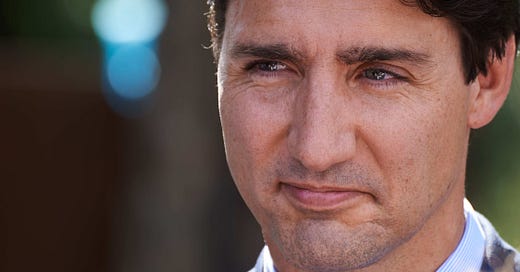Vacation was great, thanks. I return to find I’m late catching up to a Trudeau doom feeding frenzy. Don Martin: “The fall of Justin Trudeau has begun.” Hill Times: rumours of a “massive” caucus revolt. Top strategists: Liberals “risk losing next election.” Aaron Wherry: “Warning bells…crosswinds.” Chantal Hébert: “Running on empty… rot… seems to have set in.”
It’s all nearly enough to trigger Wells’s Second Rule, which as you know holds that “If everyone in Ottawa knows something, it’s not true.” At some point a sufficient number of predictions of Justin Trudeau’s political demise is all he needs to win. In theory.
The Wells Rules are art, not physics, which means when they don’t work, it’s part of their beauty. I think it’s safer to invoke two even more venerable principles of politics. First, election outcomes are never certain in advance. That’s why we have elections. Second, only two Canadian prime ministers have won four consecutive elections: John Macdonald and Wilfrid Laurier. Stephen Harper lost his fourth. So did Pierre Trudeau, though he came back to win his fifth. Knowing that demon lives in the air, somewhere out beyond the third election, is the sort of thing that will make most prime ministers more inclined to test their luck. But the demon doesn’t care. It just waits.
Meanwhile this post’s provocative headline is just a nod to the legacy of my former workplace. A headline over a Jen Gerson piece once claimed Doug Ford would be fine, and she has had to insist ever since that she didn’t write the headline. Although, damnedest thing, in the end he’s more fine than the ex-leaders of the other two parties. Anyway. The headline is also a bit of a placeholder. I mostly just want to use this post to catch up on a few stories and themes that emerged while I was away. I’m not big on speculation about the outcomes of distant elections anyway. It’s sufficient to note that the Liberals have had a shaky half-year. And since I always wish we could be well governed this week, by whichever government we already have, the shakiness matters.
Let’s talk about stuff.
1. The Russian Embassy party
To me the least upsetting part of this is that Yasemin Heinbecker, a Global Affairs Canada official, went to a Russia Day reception at the Russian Embassy, down on Free Ukraine Street across from the pro-Ukrainian protesters. The department’s original response to reporters’ queries — “we still maintain a diplomatic relation with Russia” — is true. And if a diplomat pokes her head in at a reception, that strikes me as a poor call, but not the sort of thing that’s likely to tip the balance in Donbas. Sometimes in our outrage, a sense of scale is missing.
What’s more upsetting is that the department’s original answer didn’t survive contact with the Globe and Mail’s website. Which means the government is once again advertising its skittishness. I don’t know the departmental spokesperson whose work shift began with “Nothing to see here, folks” and ended with seppuku, but I’m quite sure she was sent out by others to deliver two contradictory answers she didn’t write, and I presume the best solace she could contrive at the end of that particular day for her choice of career was that the paychecks don’t bounce.
I’ve written this before. I’m going to keep writing it. Everybody knows that if the government of Canada is doing something they don’t like, they should tell a reporter about it, because the government of Canada will instantly reverse course to make the bad headline stop hurting. Issues management squads have the only autonomy in this government. They react to headlines as Dracula did to garlic. This realization is now baked into the procedural book of everyone who deals with this government in any capacity — and, plainly, of increasing numbers of people who work inside it.
What’s more upsetting still is the later news that emails before the reception on the topic of Heinbecker’s attendance were ignored, even though the emails’ recipient list included the department’s deputy minister and the minister’s chief of staff — respectively, the top bureaucratic official and the top political staffer.
One hardly knows where to begin. Asking either of these people to make such a decision or even to be aware of it momentarily is a terrible waste of their time. Jimmy Carter managed the schedule of the White House tennis courts; this is close to that level of insane nitpicking. The existence of one email inquiring about the Ottawa social calendar implies the existence of hundreds more on other topics that could, and properly should, have been resolved way further down the food chain. But you’d only get that sort of thing — people with the authority to make decisions by themselves — if the people in this government, and indeed in governments in general, trusted one another. Instead you get email chains with huge numbers of recipients.
This diffusion of authority is defensive: if everybody is on every call, nobody is responsible for any decision. And everybody is constantly 240 emails away from an empty inbox. It’s a problem that we have a government that functions like this. I know soldiers who could explain why it’s not ideal. “Generals too far forward,” indeed.
I’m going to put my paywall here. The rest of today’s column, for paying subscribers, discusses the government’s inability to explain its use of the Emergencies Act, and Pierre Poilievre’s decision to make university research suffer when somebody says something he doesn’t like at a university somewhere. I’m grateful to everyone who subscribes; everyone who shares this post with friends or social networks; and everyone who pays to support my work here.
Keep reading with a 7-day free trial
Subscribe to Paul Wells to keep reading this post and get 7 days of free access to the full post archives.




